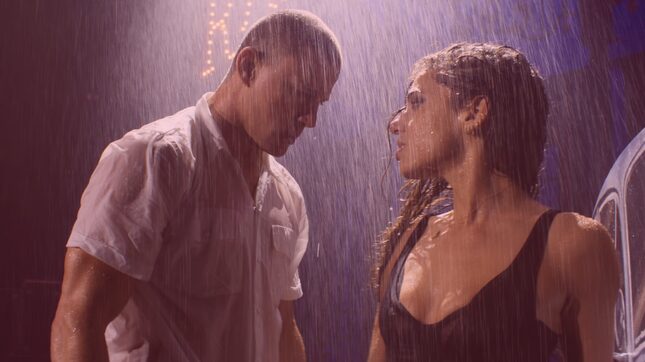Magic Mike’s Last Dance and the ‘Feminist’ Pivot
Despite the franchise’s rebranding as a cinematic feminist utopia, the third installment just appears to be selling the fantasy of men being...decent.
EntertainmentMovies

The first 10 to 15 minutes of Magic Mike’s Last Dance is truly worth the next hour-and-a-half of plot murkiness and under-baked ideas. Because Channing Tatum, returning to the third and final installment of director Steven Soderbergh’s male stripper odyssey, is just so good at what he does.
What exactly Tatum is so good at is hard to articulate, because I’m not just talking about his dance ability. His talent really has to be seen, and it’s on display in that first 10 minutes or so of the film. When we meet Mike, he is 40 years old and making ends meet with odd jobs after a string of “failed relationships and unrealized dreams.” He’s just wrapped up bartending a charity event at the Miami mansion of a rich older woman named Maxandra Mendoza (played by Salma Hayek Pinault) when she invites him into her home and propositions him: She’s heard from a friend who recognized him that he’s a stripper. How much for a lap dance? Mike says he doesn’t do that anymore. She offers him $6,000. He reconsiders.
What happens next is the best part of the movie: a sensual dance duet between Tatum and Hayek Pinault that has him grinding into her, flipping her around, gyrating his hips in her face. It could all veer off into cringe territory, but it somehow never does. That’s what makes Tatum so good, so essential to what makes this franchise work. It’s not in the way he looks; it’s not the thrust of his hips or the wind of his waist that makes him compelling to watch on screen; it’s not just his innate ability to elevate the lapdance to high art. It’s the utter intimacy, earnestness, and vulnerability with which he does those things that makes his performance so exhilarating.
After this amazing lapdance (and amazing sex, which we don’t get to see, because in the world of Magic Mike, sex itself is actually beside the point), Maxandra feels like a new woman. She wants other women to experience what she’s just experienced. She asks Mike to accompany her back to London for a mysterious, strictly business opportunity. With only a little cajoling, Mike agrees.
While the story of Mike and Max is ostensibly a love story, it’s also a story about autonomy and control and weird financial power dynamics. The first day Mike arrives in London, she buys him a new wardrobe at a fancy store and then announces that he will be the director of a new “show about empowering women” at the prestigious theater she owns, without even breaking the news to him first.
-

-

-

-

-

-

-

-

-

-

-

-

-

-

-

-

-

-

-

-

-

-

-

-

-

-

-

-

-

-

-

-

-

-

-

-

-

-

-

-








































